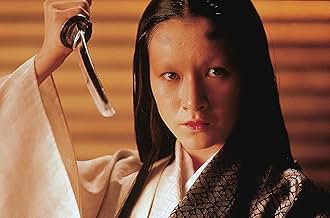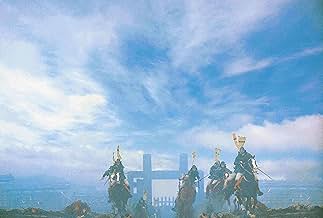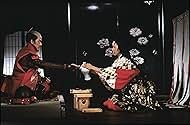Nel Giappone medievale, un anziano signore della guerra si ritira, consegnando il suo impero ai suoi tre figli. Tuttavia, sottovaluta il modo in cui il nuovo potere li corromperà e li farà r... Leggi tuttoNel Giappone medievale, un anziano signore della guerra si ritira, consegnando il suo impero ai suoi tre figli. Tuttavia, sottovaluta il modo in cui il nuovo potere li corromperà e li farà rivoltare l'uno contro l'altro.Nel Giappone medievale, un anziano signore della guerra si ritira, consegnando il suo impero ai suoi tre figli. Tuttavia, sottovaluta il modo in cui il nuovo potere li corromperà e li farà rivoltare l'uno contro l'altro.
- Regia
- Sceneggiatura
- Star
- Vincitore di 1 Oscar
- 30 vittorie e 23 candidature totali
Mansai Nomura
- Tsurumaru
- (as Takeshi Nomura)
Riepilogo
Reviewers say 'Ran' is celebrated for its epic scale, masterful direction, and stunning visuals. Adapted from Shakespeare's 'King Lear,' it is lauded for its intricate narrative, powerful performances by Tatsuya Nakadai and Mieko Harada, and deep exploration of power, corruption, and betrayal. The cinematography and battle scenes are noted for their grandeur. Some find its slow pace and long runtime challenging, yet it is often hailed as one of Kurosawa's finest works.
Recensioni in evidenza
Thankee kindly.
Kurosawa, while a great director, isn't somebody whose films I blindly endorse.
However, Ran takes the cake. It easily makes my personal top five films any time I think about it.
The imagery is absolutely stunning, and the dialogue is quite clever. The battle scenes are suitably horrific, and the humor (and yes, there is humor) is subtle enough not to get in the way.
All told, one of the greatest films it's been my privilege to see. I watched it to get the nightmare that was Cold Mountain out of my head, as proof that long movies can actually be epic, as opposed to boring, trite, and predictable.
Kurosawa, while a great director, isn't somebody whose films I blindly endorse.
However, Ran takes the cake. It easily makes my personal top five films any time I think about it.
The imagery is absolutely stunning, and the dialogue is quite clever. The battle scenes are suitably horrific, and the humor (and yes, there is humor) is subtle enough not to get in the way.
All told, one of the greatest films it's been my privilege to see. I watched it to get the nightmare that was Cold Mountain out of my head, as proof that long movies can actually be epic, as opposed to boring, trite, and predictable.
Akira Kurosawa's 1985, Ran, is based one of Shakespeare's greatest works, King's Lear. The Film proudly stands along with his other classic such as Seven Samurai, Yojimbo, Roshomon, Sanjuro and the Hidden Fortress. He is a master in the art of filmmaking, no one can film an epic battle scene quite like Kurosawa. This is recognized as the most expensive film ever made by Akira Kurosawa, it was at that time, Japan's most expensive film ever. Being at the age of 75, he still showed us, he's one of the best in the business.
This movie is about an aging lord, head of the Ichimonji family, decides to retire and to pass the power to Taro, the eldest of his three sons. He will however have to banish Saburo, the youngest one, who dared to speak the truth to him. Soon, the former lord is chased away from the castles of his sons and becomes mad when he understands that one of his sons is trying to kill him. The three brothers are fighting for control of the Kingdom, as their lust for power grows every day. Four armies are facing each other on the prairie. Lord Ichimonji's former peaceful kingdom is nothing but a distant memory.
Akira Kurosawa redefines what an epic film is, with astonishing story telling, entirely believable characters and real life battle scenes without the use of Special effects/CGI. He retells the story of King Lear in his own way and no one would recognize that it was actually a adaptation beforehand. But just like Shakespeare, there is humor, irony, death and not a happy ending. Everyone who played a part in the production of this film, deserves some kind of recognition. The acting is pretty much excellent and certainly believable.
10/10 Kurosawa is a Genius
This movie is about an aging lord, head of the Ichimonji family, decides to retire and to pass the power to Taro, the eldest of his three sons. He will however have to banish Saburo, the youngest one, who dared to speak the truth to him. Soon, the former lord is chased away from the castles of his sons and becomes mad when he understands that one of his sons is trying to kill him. The three brothers are fighting for control of the Kingdom, as their lust for power grows every day. Four armies are facing each other on the prairie. Lord Ichimonji's former peaceful kingdom is nothing but a distant memory.
Akira Kurosawa redefines what an epic film is, with astonishing story telling, entirely believable characters and real life battle scenes without the use of Special effects/CGI. He retells the story of King Lear in his own way and no one would recognize that it was actually a adaptation beforehand. But just like Shakespeare, there is humor, irony, death and not a happy ending. Everyone who played a part in the production of this film, deserves some kind of recognition. The acting is pretty much excellent and certainly believable.
10/10 Kurosawa is a Genius
One of the last great films directed by Akira Kurosawa. A father gives his land and his power to his three sons. They turn against each other and against their father.
Based on Shakespeare's King Lear 'Ran' is a very good film. It was very expensive and you can see that. Over ten years Kurosawa was busy on this project and in 1985 it was finally there. Very well made, with beautiful costumes, music and cinematography, a great direction and some good performances. Although I think Kurosawa has done better ('Rashomon', 'Ikiru', 'Yojimbo' and of course 'Shichinin no Samurai') 'Ran' definitely belongs to his best.
Based on Shakespeare's King Lear 'Ran' is a very good film. It was very expensive and you can see that. Over ten years Kurosawa was busy on this project and in 1985 it was finally there. Very well made, with beautiful costumes, music and cinematography, a great direction and some good performances. Although I think Kurosawa has done better ('Rashomon', 'Ikiru', 'Yojimbo' and of course 'Shichinin no Samurai') 'Ran' definitely belongs to his best.
Throughout his career Kurosawa strove to achieve what he called "real cinema", proclaiming that "in all [his] films, there's [only] three or four minutes" of such quality. Many would argue that he was his greatest critic. For if not in "Seven Samurai", then definitely in "Ikiru" and if not in "High and Low", then definitely in "Rashomon" he must have achieved this plateau of greatness. Well, if not in any of his other films, then definitely in "Ran" Kurosawa finally came to the apex of cinematic artistry. With the both lyrical and grandiose tone of its craft, its beautifully spare imagery, its haunting score by Toru Takemitsu, and its lead Tatsuya Nakadai's masterful understated performance, "Ran" is perhaps the most fully realized epic ever made.
The tale, which is an adaptation of Shakespeare's "King Lear", begins as Lord Hidetora Ichimonji and his court are out hunting. During a break in the hunt, Hidetora proclaims his adbication from the hight seat of the Great Lord and bestows his lands unto his three sons, dividing them up equally. He declares his oldest to be his successor in power. When his youngest son and one of his faithful nobles, express their concerns on this idea, Hidetora foolishly banishes them both, mistaking their advice as insolence. With this opening scene, the peaces are aligned and soon 'chaos' as the film is aptly named will break out throughout the land. From here, we see the downfall of Hidetora and all those who surround him. The film retains all the themes of the original play, but also thanks to Kurosawa's own input addresses a slew of even more varied ideas. Like Shakespeare, Kurosawa is greatly interested in the responsibility of the leader and the hypocrisies and ironies of an autocratic system. The most obvious though not the central theme in the whole film is war, and Kurosawa explores this theme to its full extent throughout the film. In perhaps the most grandiose battle scene every filmed, he demonstrates the destructive consequences and the paradoxical beauty of conflict.
Here, Kurosawa implements the camera with masterful skill not once employing the editing/photography tricks and gimmicks so often seen in films (even the good ones) today. This director has an awareness of the past and the history of film, but also the creative spontaneity of a true genius. In "Ran", he focuses on the more methodically simple yet artistically complex montage of Eisenstein, and on the strict compositions of Ozu. He employs the most basic and yet most artistic of techniques. Each shot is planned to precision, and each cut is made for a purpose. The coreagraphy and blocking of each scene is simple and powerful, and Kurosawa allows the actors to play out these scenes without the intrusion of the camera or the editor. Thus, the director prevents the style from eclipsing the already powerful material he has to work with. Simply put, "Ran" is a masterpiece that flows and develops like an opera, from its forebodingly peaceful ouverture to its bloody Shakespearean heart until its final, quietly subdued, and sorrowful denouement.
The tale, which is an adaptation of Shakespeare's "King Lear", begins as Lord Hidetora Ichimonji and his court are out hunting. During a break in the hunt, Hidetora proclaims his adbication from the hight seat of the Great Lord and bestows his lands unto his three sons, dividing them up equally. He declares his oldest to be his successor in power. When his youngest son and one of his faithful nobles, express their concerns on this idea, Hidetora foolishly banishes them both, mistaking their advice as insolence. With this opening scene, the peaces are aligned and soon 'chaos' as the film is aptly named will break out throughout the land. From here, we see the downfall of Hidetora and all those who surround him. The film retains all the themes of the original play, but also thanks to Kurosawa's own input addresses a slew of even more varied ideas. Like Shakespeare, Kurosawa is greatly interested in the responsibility of the leader and the hypocrisies and ironies of an autocratic system. The most obvious though not the central theme in the whole film is war, and Kurosawa explores this theme to its full extent throughout the film. In perhaps the most grandiose battle scene every filmed, he demonstrates the destructive consequences and the paradoxical beauty of conflict.
Here, Kurosawa implements the camera with masterful skill not once employing the editing/photography tricks and gimmicks so often seen in films (even the good ones) today. This director has an awareness of the past and the history of film, but also the creative spontaneity of a true genius. In "Ran", he focuses on the more methodically simple yet artistically complex montage of Eisenstein, and on the strict compositions of Ozu. He employs the most basic and yet most artistic of techniques. Each shot is planned to precision, and each cut is made for a purpose. The coreagraphy and blocking of each scene is simple and powerful, and Kurosawa allows the actors to play out these scenes without the intrusion of the camera or the editor. Thus, the director prevents the style from eclipsing the already powerful material he has to work with. Simply put, "Ran" is a masterpiece that flows and develops like an opera, from its forebodingly peaceful ouverture to its bloody Shakespearean heart until its final, quietly subdued, and sorrowful denouement.
With RAN (1985) Akira Kurosawa seems to be setting up a macarbe trap. The first section of the film is slow, following an aging warlord (Tatsuya Nakadai's best acting in a long wonderous career.) dividing his castles amongst his unsavory sons. The action is slow, people talk in low tones, it's almost at snail's pace. But then, a battle scene like nothing you ever seen before explodes on the screen. The film takes a 180 degree turn and becomes more and more sinister, more compelling. You can't look away.
Akira Kurosawa (1910-1997) was responsible for elevating Japanese cinema to a front-runner in world cinema. Two of his films, RASHOMON and SEVEN SAMURAI were made in less than ten years after World War II. These films put a spotlight on Japanese culture. Some of his later films, THE HIDDEN FORTRESS, THE BAD SLEEP WELL, YOJIMBO and HIGH AND LOW became the basis for a good percentage of the major American films produced after 1960.
If you sit down to see RAN, be prepared for a jaw-dropping experience.
Akira Kurosawa (1910-1997) was responsible for elevating Japanese cinema to a front-runner in world cinema. Two of his films, RASHOMON and SEVEN SAMURAI were made in less than ten years after World War II. These films put a spotlight on Japanese culture. Some of his later films, THE HIDDEN FORTRESS, THE BAD SLEEP WELL, YOJIMBO and HIGH AND LOW became the basis for a good percentage of the major American films produced after 1960.
If you sit down to see RAN, be prepared for a jaw-dropping experience.
Lo sapevi?
- QuizAkira Kurosawa's wife of 39 years, Yôko Yaguchi, died during the production of this film. Kurosawa halted filming for just one day to mourn before resuming work on the picture.
- BlooperDuring the siege on the third castle, the corpse of one of Hidetora's guards suddenly shuts his eyes just before a volley of arrows flies past him.
- ConnessioniFeatured in A.K. (1985)
I più visti
Accedi per valutare e creare un elenco di titoli salvati per ottenere consigli personalizzati
Dettagli
Botteghino
- Budget
- 11.500.000 USD (previsto)
- Lordo Stati Uniti e Canada
- 4.314.927 USD
- Fine settimana di apertura Stati Uniti e Canada
- 3567 USD
- 2 lug 2000
- Lordo in tutto il mondo
- 4.385.618 USD
- Tempo di esecuzione2 ore 40 minuti
- Colore
- Proporzioni
- 1.85 : 1
Contribuisci a questa pagina
Suggerisci una modifica o aggiungi i contenuti mancanti



































